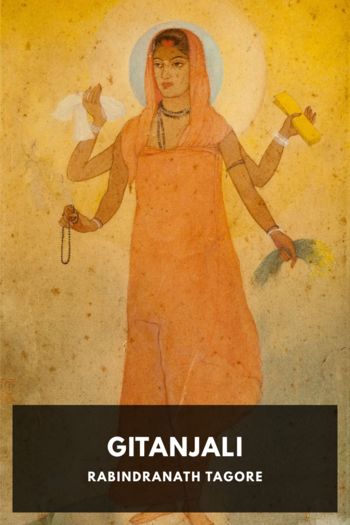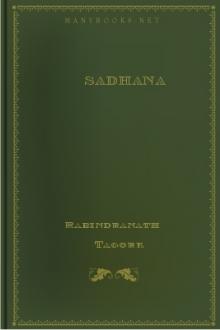author - "Rabindranath Tagore"

Description Widely regarded as one of the most important figures in Indian (and more specifically Bengali) literary history, Rabindranath Tagore was the first Indian—indeed, the first person outside Europe—to win the Nobel Prize in Literature, largely in recognition of his “spiritual offering of songs,” Gitanjali. Tagore himself translated the poems from the original Bengali, taking many liberties in the process. His English translation is rightly recognized as a work distinct from the Bengali

The raindrops kissed the earth and whispered,--"We are thy homesick children, mother, come back to thee from the heaven."161 The cobweb pretends to catch dew-drops and catches flies. 162 Love! when you come with the burning lamp of pain in your hand, I can see your face and know you as bliss. 163 "The learned say that your lights will one day be no more." said the firefly to the stars. The stars made no answer. 164 In the dusk of the evening the bird of some early dawn comes

s postman when I grow up.WATCHMAN. Ha! ha! Postman, indeed! Rain or shine, rich orpoor, from house to house delivering letters--that's very greatwork! AMAL. That's what I'd like best. What makes you smile so? Oh,yes, your work is great too. When it is silent everywhere in theheat of the noonday, your gong sounds, Dong, dong, dong,-- andsometimes when I wake up at night all of a sudden and find ourlamp blown out, I can hear through the darkness your gong slowlysounding, Dong, dong, dong!

it, likewise, if the daughter-in-law [7] of the Rajah's house had left its seclusion. She was even prepared for this happening. But I did not consider it important enough to give her the pain of it. I have read in books that we are called "caged birds". I cannot speak for others, but I had so much in this cage of mine that there was not room for it in the universe--at least that is what I then felt.The grandmother, in her old age, was very fond of me. At the bottom of her fondness was

linkwith the infinite, judges his activity by its movement and not bythe repose of perfection--the repose which is in the starryheavens, in the ever-flowing rhythmic dance of creation.The first invasion of India has its exact parallel in theinvasion of America by the European settlers. They also wereconfronted with primeval forests and a fierce struggle withaboriginal races. But this struggle between man and man, and manand nature lasted till the very end; they never came to anyterms. In India

s going on," I said, "and I am busy. Could you perhaps come another day?"At once he turned to go; but as he reached the door he hesitated, and said: "May I not see the little one, sir, for a moment?" It was his belief that Mini was still the same. He had pictured her running to him as she used, calling "O Cabuliwallah! Cabuliwallah!" He had imagined too that they would laugh and talk together, just as of old. In fact, in memory of former days he had brought,

Description Widely regarded as one of the most important figures in Indian (and more specifically Bengali) literary history, Rabindranath Tagore was the first Indian—indeed, the first person outside Europe—to win the Nobel Prize in Literature, largely in recognition of his “spiritual offering of songs,” Gitanjali. Tagore himself translated the poems from the original Bengali, taking many liberties in the process. His English translation is rightly recognized as a work distinct from the Bengali

The raindrops kissed the earth and whispered,--"We are thy homesick children, mother, come back to thee from the heaven."161 The cobweb pretends to catch dew-drops and catches flies. 162 Love! when you come with the burning lamp of pain in your hand, I can see your face and know you as bliss. 163 "The learned say that your lights will one day be no more." said the firefly to the stars. The stars made no answer. 164 In the dusk of the evening the bird of some early dawn comes

s postman when I grow up.WATCHMAN. Ha! ha! Postman, indeed! Rain or shine, rich orpoor, from house to house delivering letters--that's very greatwork! AMAL. That's what I'd like best. What makes you smile so? Oh,yes, your work is great too. When it is silent everywhere in theheat of the noonday, your gong sounds, Dong, dong, dong,-- andsometimes when I wake up at night all of a sudden and find ourlamp blown out, I can hear through the darkness your gong slowlysounding, Dong, dong, dong!

it, likewise, if the daughter-in-law [7] of the Rajah's house had left its seclusion. She was even prepared for this happening. But I did not consider it important enough to give her the pain of it. I have read in books that we are called "caged birds". I cannot speak for others, but I had so much in this cage of mine that there was not room for it in the universe--at least that is what I then felt.The grandmother, in her old age, was very fond of me. At the bottom of her fondness was

linkwith the infinite, judges his activity by its movement and not bythe repose of perfection--the repose which is in the starryheavens, in the ever-flowing rhythmic dance of creation.The first invasion of India has its exact parallel in theinvasion of America by the European settlers. They also wereconfronted with primeval forests and a fierce struggle withaboriginal races. But this struggle between man and man, and manand nature lasted till the very end; they never came to anyterms. In India

s going on," I said, "and I am busy. Could you perhaps come another day?"At once he turned to go; but as he reached the door he hesitated, and said: "May I not see the little one, sir, for a moment?" It was his belief that Mini was still the same. He had pictured her running to him as she used, calling "O Cabuliwallah! Cabuliwallah!" He had imagined too that they would laugh and talk together, just as of old. In fact, in memory of former days he had brought,